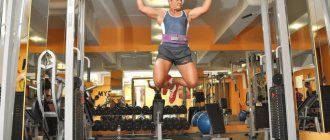When it comes to calories, usually the first question that comes to everyone's mind is “how many?” Well, maybe not always. Researchers have found that in fact, especially when it comes to weight loss, the answer to the “when?” question deserves more attention. This means that the timing of meals is also important, as it can affect the absorption of foods and, accordingly, help or slow down weight loss. A recent study published in the journal Current Biology
1 found that the number of calories people burn while resting actually changes at different times of the day—and this has a lot to do with the body's biological clock, also called the circadian rhythm.
What is circadian rhythm?
In fact, this is our internal biological clock, adjusting the body to the rhythms of nature. The National Sleep Foundation defines circadian rhythms as the internal clock that runs within the brain twenty-four hours a day and periodically switches a person between states of sleep and wakefulness.2
The circadian rhythm is controlled by a part of the brain called the hypothalamus, but it can also be influenced by other factors such as light and darkness. This explains why in the winter, when the days get shorter, we often feel sleepy earlier in time - our circadian rhythm largely coincides with the day-night cycle.
And this is important to know. After all, our circadian rhythm works best with a regular sleep schedule, that is, when we wake up in the morning and go to bed at the same time every day.
Biorhythms, physiological processes and fat burning
All processes occurring in the body, including the production of hormones, are influenced by circadian rhythms. Insulin production peaks around noon, and growth hormone production peaks at night. Testosterone, which plays an important role in muscle building, is produced mostly in the morning.
Indicators of protein, fat, carbohydrate and electrolyte metabolism are also influenced by the time of day. The peristalsis of the gastrointestinal tract and its ability to absorb nutrients is higher during the day than at night. Salivation and gastric secretion occur with greater intensity during the daytime.
Scientists have found a link between circadian rhythm disturbances and energy expenditure or fat burning. Numerous studies have confirmed that the fat burning process is much better in the morning.
Strength training early in the morning
For strength training early in the morning and when there is no time for a pre-breakfast, it is critical to take a portion of the gainer immediately after waking up - otherwise the body simply will not have energy.
By the time you come to the gym, sports nutrition will already be absorbed and its energy will enter the bloodstream. In this case, breakfast itself is recommended after the end of the workout, and not before it - it is quite difficult to train on a full stomach. Remember that it will take several weeks for your body to enter such a mode of operation - however, after this period, you will fall in love with morning workouts.
Study
The results of this groundbreaking study showed that among seven subjects, resting metabolic rate varied even when caloric intake, sleep capacity, and exercise severity were constant across all phases. This shows the influence of the circadian rhythm on metabolic rate.
But how did scientists manage to determine this? Well, first of all, the study was conducted in an adapted laboratory, which was specially designed so that the participants could not tell the time - no clocks, windows, phones or the Internet.
Participants were given a time to go to bed and a time to wake up, and each evening this time changed - moving forward four hours compared to the previous evening. It's as if they flew west every day for three weeks, crossing four time zones. The purpose of this time reversal was to disorient the participants' internal clocks in order to reset their circadian rhythm and allow them to continue at their own pace. The researchers could then determine everyone's baseline metabolism, without external factors influencing it.
Morning workouts and fat burning
Most competitive bodybuilders swear by the benefits of morning cardio before their first meal. They believe it helps them burn more fat and increases their metabolic rate for the day ahead. There are research results that support this point of view, but scientists and physiologists do not entirely agree with this. They support the energy balance hypothesis, which states that if you burn more calories than you consume in each 24-hour period, then it doesn't matter when you burn them or whether they come from fat or carbohydrates.
If you have even a basic knowledge of physiology, you must agree that the timing of your cardio training is not the most important factor in burning fat. Exercise when it suits you and follow a moderate diet - these are the most important rules. However, there are arguments for early training on an empty stomach. They sound like this:
1. When you wake up in the morning after an 8-12 hour fast, your glycogen stores are depleted. Training under such conditions forces the body to mobilize fat, since there is not enough glycogen.
2. Eating food causes the release of insulin, which interferes with the mobilization of fats. The body has the least amount of insulin in the morning, which means you will burn the most fat at this time.
3. After a night's sleep, there are fewer carbohydrates (glucose) in your blood, which means you can burn more fat.
4. If you eat right before training, you will burn these carbohydrates, not fat.
5. When you exercise in the morning, your metabolism stays elevated all day. If you do your cardio in the evening, you'll only burn calories during that time, which is great, but you won't get the boost in metabolism in the hours that follow as you go to bed.
Scientists support this theory. Research conducted at Kansas State University and published in Medicine and Science in Sports and Exercise found that subjects burned a pound of fat faster when they exercised on an empty stomach in the morning than when they exercised at other times of the day. The researchers measured respiratory gas exchange, caloric expenditure, carbohydrate and fatty acid metabolism and found that calories released from fat burning accounted for 67% of total energy expenditure during exercise in the morning after a 12-hour fast. This is significantly higher than the 50% rate for those who exercised at other times of the day or immediately after eating.
Another study, published in the Journal of Applied Physiology, compared the effects of aerobic exercise on lipid oxidation between a full and an empty stomach. The researchers concluded: "Our results support the hypothesis that exercise training increases lipid oxidation in men following a 12-hour overnight fast." Here is an excerpt from the article “Optimizing Exercise for Fat Loss”: “The ability of exercise to selectively promote fat oxidation is optimal if exercise is performed on an empty stomach during the accelerated morning metabolism.”
Despite the fact that the fact of increased fat burning during morning aerobics seems quite logical and is supported by scientists, most physiologists do not agree with this. The main argument is that you can always find research that will support almost any theory you intend to defend. Interestingly, even gray-haired academics agree that you will burn more fat than sugar by exercising on an empty stomach. The real question is whether this affects overall fat loss over a long period of time.
Sports physiologist Greg Landry, author of The Metabolism System for Weight Loss and Fitness, says: “I agree that you burn slightly more fat as fuel when exercising on an empty stomach, but the real question is, does it really matter? I believe that there is a certain pool of calories stored in different forms throughout the body (fat, glycogen, etc.), from which we get calories to burn. If now we took a little more fat, then, probably, later the calories received from food will make up for its loss, since the glycogen stores at that time will be more complete. All this is transfusion from one vessel to another.”
Lyle MacDonald, bodybuilding nutrition expert and author of The Ketogenic Diet, agrees. He says the body compensates throughout the day and it's ridiculous to follow such a strategy: "All the research says is that you'll burn more fat by doing it this way, and I agree with that 100%. But while overall weight loss is happening, it doesn’t matter what exactly you burn, only the 24-hour calorie balance is important. If you burn glucose during exercise, you will burn more fat at other times of the day. If you burn fat during exercise, you will burn more glucose later. The end result is the same. If this were not true, then athletes such as sprinters who never burn fat in training would not be lean. They burn so many calories that they stay balanced and don't gain fat. So, while morning cardio does provide some psychological benefits for bodybuilders who enjoy this type of program, I wouldn't say it translates into overall body fat reduction at all."
When it comes to losing fat, there is hardly anyone more experienced in this matter than Chris Aceto. A high-level bodybuilder and nutritionist who has consulted with many of the world's leading bodybuilding professionals, Aceto is a firm believer in morning cardio training. He, without any doubt, states: “The fastest way to get rid of fat deposits is morning cardio training on an empty stomach.” He believes that looking at calories in and out only in terms of energy is "limited." Success depends on a number of factors, not just energy balance. We return to the age-old question, are all calories the same? “Absolutely not! - says Aceto. — A calorie is not just a calorie. Any physiologist shudders when he hears something like this.”
“All these people are talking about is calorie intake and calorie expenditure,” Chris continues. - Judging by their statements, if I eat nothing but candy and Coca-Cola and eat 100 fewer calories than I need to maintain my normal weight, I will immediately lose weight. We know it's not that simple. Don't forget about the ratio of carbohydrates, proteins and fats. Next comes meal frequency: We know from a lot of data that we will gain more muscle mass with 5-6 meals a day than with three. It's not just about calories, there are other factors."
There are more reasons why you should include morning cardio in your schedule. Landry, despite his doubts about the importance of the fuel source, Fr.
Here are some more arguments in their favor:
1. They will make you feel great all day long, thanks to the release of mood-boosting endorphins.
2. They will nourish you with energy and invigorate you.
3. They will help regulate your appetite throughout the day.
4. Your body clock will adjust to your morning workouts, making it easier to wake up in the morning.
5. Morning workouts will be more successful than those when you're tired from the work day and friends tempt you to have a drink.
6. You can always find time to workout by setting your alarm a little earlier.
7. Morning workouts will raise your metabolic rate throughout the day.
Of all the benefits listed above, the most frequently discussed is the last one. Scientists call this phenomenon “additional post-exercise oxygen consumption.” Tracking just the number and type of calories burned during a workout won't give you the full picture. You also need to take into account the calories that your increased metabolism will continue to burn afterward. Yes exactly. Work out in the morning and you'll burn calories all day. Imagine sitting at work and burning fat! This is good, but the bad news is that the additional post-exercise oxygen consumption is not as great as many people think.
It's a myth that your metabolism stays elevated 24 hours after finishing your workout. This only happens after ultra-intense or prolonged exercise, such as a marathon.
After low-intensity training, the amount of additional post-exercise oxygen consumption is so small that its effect on fat loss is not worth talking about. You burn anywhere from 9-30 extra calories after exercising at an intensity of 60-65% of your maximum heart rate. In other words, just running on a treadmill will do little to boost your metabolism. Additional post-exercise oxygen consumption, however, increases with increasing intensity and duration of exercise. According to Wilmore and Costill in their Physiology of Sport and Exercise, additional post-exercise oxygen consumption after moderate exercise (75-80%) increases by about 0.25 calories per minute or 15 calories per hour. This will result in an additional expenditure of 75 calories. It seems like a small number, but if you do the math, in a year (in theory) you will lose an additional 2.5 kg of fat just from the calories burned after the workout.
High-intensity interval training allows you to achieve the best results. You alternate periods of high (85% of maximum and above) intensity with short periods of low intensity. Studies of high-intensity interval training have demonstrated much higher additional post-exercise oxygen consumption, which can significantly increase daily energy expenditure. In one study, researchers at the University of Alabama observed the effects of two training programs on daily energy expenditure. The first group worked on exercise bikes for 60 minutes at medium intensity, the second trained according to a high-intensity interval training program: two minutes of high-intensity work on an exercise bike and two minutes of low-intensity work. The second group burned more calories in 24 hours than the first. All of this could result in a person losing an additional 5kg of fat over the course of a year, provided they do high-intensity interval training five days a week instead of regular exercise.
Paradoxically, lifting weights causes much more additional post-exercise oxygen consumption than regular aerobics. Research shows that metabolic rate remains elevated by 4-7% for 24 hours after training. Yes, this means that bodybuilding burns fat through some indirect mechanisms. For someone who burns 2,500 calories per day, this will translate into burning another 100-175 calories after finishing the workout. The lesson is simple: anyone who wants to get rid of excess weight and is not already involved in bodybuilding should first switch to weight training. Then, and only then, can you start thinking about morning cardio!
Everyone is interested in the consequences of aerobics, especially high-intensity exercise, in terms of the danger of losing muscle. After an overnight fast, glycogen, glucose, and insulin levels in the blood are low. As you can guess, these are optimal conditions for burning fat. Unfortunately, these same conditions are optimal for burning muscle because carbohydrates are low and levels of the catabolic hormone cortisol are high. It would seem that morning cardio training is a double-edged sword, but it is possible to avoid muscle tissue loss.
All aerobic exercise has some impact on your muscles, but as long as you don't overdo it, there's no need to worry about losing muscle tissue. It's true that your body breaks down muscle proteins for energy during aerobic exercise, but it breaks down and rebuilds muscle fibers all the time throughout your body. This process is called protein cycling, and it is necessary for normal life. Your goal is to increase its anabolic component and decrease its catabolic component just enough to remain in an anabolic state, that is, gain (or at least maintain) muscle mass.
How to build more muscle than you lose? The first is to avoid excesses in cardio training. Aceto suggests limiting morning exercise on an empty stomach to 30 minutes, then "amino acids are less likely to be used as fuel." He also mentions that “a strong cup of coffee will help you burn more fat than glycogen. And if you can save glycogen, you can save protein.” You can also experiment with a thermogenic mixture of ephedrine, caffeine and aspirin, or similar herbal preparations.
The next point is to provide your body with proper nutritional support. Errors in diet are more likely to cause muscle loss than aerobics itself. To maintain muscle, eat healthy throughout the day, which includes adequate meal frequency, carbohydrates, proteins, and total calories. And third, train with heavy weights even during the fat loss phase. It's a mistake to think that light weights and high reps will help you get lean. What helps build muscle will also help maintain it.
Are you shocked by the prospect of losing hard-earned muscle, but still want to benefit from fat-burning morning cardio? One option that many bodybuilders resort to is a protein meal or shake 30-60 minutes before their morning workout. Protein without carbohydrates minimizes the insulin response and allows you to mobilize fat, while simultaneously supplying the body with amino acids that prevent the breakdown of muscle fibers.
Obviously, morning cardio training has a number of undeniable benefits that make many people get up a little earlier in the morning. But let's try to summarize. Do morning workouts actually lead to greater fat loss than workouts done at other times of the day? Experience, common sense and experimental results suggest that yes. However, the debate continues and further research is needed. While scientists in their labs are busy measuring gas exchange, calorie expenditure, and basal utilization levels, I intend to continue getting up at six in the morning to hop on the cardio machine.
Why is resting metabolic rate so important?
Essentially, basal metabolism is the key to weight loss. This is the amount of energy, or the number of calories, that you expend to carry out basic life functions, such as breathing, regulating temperature and brain activity, and blood circulation. So, the higher your basal metabolic rate, the more calories your body will burn, even before you start exercising.
Scientists' conclusion
The researchers found that the lowest basal metabolic rate was observed in subjects in a state that the scientists designated as 0° circadian phase - according to the biological clock "deep night" - and accompanied by the lowest body temperature.
The highest resting metabolic rate was recorded after approximately twelve hours, in a phase designated as 180°, or "biological day to early evening."
In the course of the study, scientists came to the following conclusion: “When a person is awake and resting, his body burns the least amount of calories at the end of the biological night, and the most calories during the biological day and evening.”
So it seems that along with what you eat, the timing of your meals is an equally important factor.
Best time to exercise
When it comes to the best time to exercise, it's important to differentiate between strength training for muscle growth and cardio training for fat burning.
They use different mechanisms to obtain energy to work and that is why the body practically cannot burn fat and grow muscle at the same time. Traditionally, it is believed that the morning is the best period for training to burn fat, and the afternoon and evening for training to gain muscle mass. However, in most cases, the choice of time for training is determined by external factors and, above all, work or study schedules.
How to support your biological clock
The most effective external cues that can support the 24-hour biological cycle are light and darkness. The brain, receiving appropriate signals from visual receptors, starts or stops the process of producing certain hormones. At night, the brain produces melatonin, and as soon as it receives a signal from outside light (this can be daylight or lamplight), the production of the hormone decreases significantly, and when exposed to bright light, it stops. Melatonin is an antioxidant and slows down aging. This is why you should sleep in the dark.
Some organs work according to their own rhythms. Thus, the rhythmic phases of the liver, which cleanses the body of metabolic products, are determined by periods of nutrition and fasting and depend to a greater extent on the moment of food intake than on day or night. Abstaining from eating from ten o'clock in the evening to eight in the morning will promote weight loss.
Additionally, the following actions will help you support your circadian rhythm:
- eat fruits and vegetables rich in antioxidants;
- sleep in a dark room;
- don't eat late at night;
- avoid exercise late at night;
- get enough sleep.
Morning workouts to burn fat
Fat burning occurs exclusively when blood sugar levels are low.
The reason lies in the fact that insulin, increased by sugar, is necessary for the formation of energy reserves, while the hormone adrenaline is needed to remove this energy from cells. In this case, hormones cannot be synthesized at the same time. For this reason, slow cardio lasting at least 30-40 minutes is recommended for weight loss - first, the body uses up glycogen reserves, insulin levels decrease, then adrenaline increases, activating fat burning. However, in the morning this process happens much faster.











